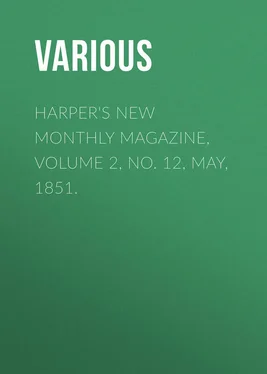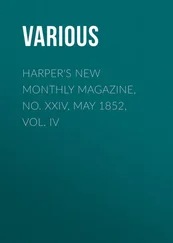Various - Harper's New Monthly Magazine, Volume 2, No. 12, May, 1851.
Здесь есть возможность читать онлайн «Various - Harper's New Monthly Magazine, Volume 2, No. 12, May, 1851.» — ознакомительный отрывок электронной книги совершенно бесплатно, а после прочтения отрывка купить полную версию. В некоторых случаях можно слушать аудио, скачать через торрент в формате fb2 и присутствует краткое содержание. Издательство: Иностранный паблик, Жанр: periodic, foreign_edu, на английском языке. Описание произведения, (предисловие) а так же отзывы посетителей доступны на портале библиотеки ЛибКат.
- Название:Harper's New Monthly Magazine, Volume 2, No. 12, May, 1851.
- Автор:
- Издательство:Иностранный паблик
- Жанр:
- Год:неизвестен
- ISBN:нет данных
- Рейтинг книги:3 / 5. Голосов: 1
-
Избранное:Добавить в избранное
- Отзывы:
-
Ваша оценка:
- 60
- 1
- 2
- 3
- 4
- 5
Harper's New Monthly Magazine, Volume 2, No. 12, May, 1851.: краткое содержание, описание и аннотация
Предлагаем к чтению аннотацию, описание, краткое содержание или предисловие (зависит от того, что написал сам автор книги «Harper's New Monthly Magazine, Volume 2, No. 12, May, 1851.»). Если вы не нашли необходимую информацию о книге — напишите в комментариях, мы постараемся отыскать её.
Harper's New Monthly Magazine, Volume 2, No. 12, May, 1851. — читать онлайн ознакомительный отрывок
Ниже представлен текст книги, разбитый по страницам. Система сохранения места последней прочитанной страницы, позволяет с удобством читать онлайн бесплатно книгу «Harper's New Monthly Magazine, Volume 2, No. 12, May, 1851.», без необходимости каждый раз заново искать на чём Вы остановились. Поставьте закладку, и сможете в любой момент перейти на страницу, на которой закончили чтение.
Интервал:
Закладка:
"I'm curious to hear how he was received in Vienna after this," said I. "I suppose you accompanied him to that city."
"Troth I did, and a short life we led there; but here we are now, at the end of our journey. That's Father Doogan's down there, that small, low, thatched house in the hollow."
"A lonely spot, too. I don't see another near it for miles on any side."
"Nor is there. His chapel is at Murrah, about three miles off. My eyes isn't over good; but I don't think there's any smoke coming out of the chimley."
"You are right – there is not."
"He's not at home, then, and that's a bad job for us, for there's not another place to stop the night in."
"But there will be surely some one in the house."
"Most likely not; 'tis a brat of a boy from Murrah does be with him when he's at home, and I'm sure he's not there now."
This reply was not very cheering, nor was the prospect itself much brighter. The solitary cabin, to which we were approaching, stood in a rugged glen, the sides of which were covered with a low furze, intermixed here and there with the scrub of what once had been an oak forest. A brown, mournful tint was over every thing – sky and landscape alike; and even the little stream of clear water that wound its twining course along, took the same color from the gravelly bed it flowed over. Not a cow nor sheep was to be seen, nor even a bird; all was silent and still.
"There's few would like to pass their lives down there, then!" said my companion, as if speaking to himself.
"I suppose the priest, like a soldier, has no choice in these matters."
"Sometimes he has, though. Father Doogan might have had the pick of the county, they say; but he chose this little quiet spot here. He's a friar of some ordher abroad, and when he came over, two or three years ago, he could only spake a little Irish, and, I believe, less English; but there wasn't his equal, for other tongues, in all Europe. They wanted him to stop and be the head of a college somewhere in Spain, but he wouldn't. 'There was work to do in Ireland,' he said, and there he'd go, and to the wildest and laste civilized bit of it besides; and ye see that he was not far out in his choice when he took Murrah."
"Is he much liked here by the people?"
"They'd worship him, if he'd let them, that's what it is; for if he has more larnin' and knowledge in his head than ever a bishop in Ireland, there's not a child in the barony his equal for simplicity. He that knows the names of the stars, and what they do be doing, and where the world's going, and what's comin' afther her, hasn't a thought for the wickedness of this life, no more than a sucking infant! He could tell you every crop to put in your ground from this to the day of judgment, and I don't think he'd know which end of the spade goes into the ground."
While we were thus talking, we reached the door, which, as well as the windows, was closely barred and fastened. The great padlock, however, on the former, with characteristic acuteness, was locked without being hasped, so that, in a few seconds, my old guide had undone all the fastenings, and we found ourselves under shelter.
A roomy kitchen, with a few cooking utensils, formed the entrance hall; and as a small supply of turf stood in one corner, my companion at once proceeded to make a fire, congratulating me as he went on with the fact of our being housed, for a long-threatening thunder storm had already burst, and the rain was swooping along in torrents.
While he was thus busied I took a ramble through the little cabin, curious to see something of the "interior" of one whose life had already interested me. There were but two small chambers, one at either side of the kitchen. The first I entered was a bedroom, the only furniture being a common bed, or a tressel like that of an hospital, a little colored print of St. Michael adorning the wall overhead. The bed-covering was cleanly, but patched in many places, and bespeaking much poverty, and the black "soutane" of silk that hung against the wall seemed to show long years of service. The few articles of any pretension to comfort were found in the sitting-room, where a small book-shelf with some well-thumbed volumes, and a writing-table covered with papers, maps, and a few pencil-drawings, appeared. All seemed as if he had just quitted the spot a few minutes before; the pencil lay across a half-finished sketch; two or three wild plants were laid within the leaves of a little book on botany; and a chess problem, with an open book beside it, still waited for solution on a little board, whose workmanship clearly enough betrayed it to be by his own hands.
I inspected every thing with an interest inspired by all I had been hearing of the poor priest, and turned over the little volumes of his humble library to trace, if I might, some clew to his habits in his readings. They were all, however, of one cast and character – religious tracts and offices, covered with annotations and remarks, and showing, by many signs the most careful and frequent perusal. It was easy to see that his taste for drawing or for chess were the only dissipations he permitted himself to indulge. What a strange life of privation, thought I, alone and companionless as he must be! and while speculating on the sense of duty which impelled such a man to accept a post so humble and unpromising, I perceived that on the wall right opposite to me there hung a picture, covered by a little curtain of green silk.
Curious to behold the saintly effigy so carefully enshrined, I drew aside the curtain, and what was my astonishment to find a little colored sketch of a boy about twelve years old, dressed in the tawdry and much-worn uniform of a drummer. I started. Something flashed suddenly across my mind, that the features, the dress, the air, were not unknown to me. Was I awake, or were my senses misleading me? I took it down and held it to the light, and as well as my trembling hands permitted, I spelled out, at the foot of the drawing, the words "Le Petit Maurice, as I saw him last." Yes: it was my own portrait, and the words were in the writing of my dearest friend in the world, the Père Michael. Scarce knowing what I did, I ransacked books and papers on every side, to confirm my suspicions, and although his name was nowhere to be found, I had no difficulty in recognizing his hand, now so forcibly recalled to my memory.
Hastening into the kitchen, I told my guide, that I must set out to Murrah at once, that it was above all important that I should see the priest immediately. It was in vain that he told me he was unequal to the fatigue of going further, that the storm was increasing, the mountain torrents were swelling to a formidable size, that the path could not be discovered after dark; I could not brook the thought of delay, and would not listen to the detail of difficulties. "I must see him and I will," were my answers to every obstacle. If I were resolved on one side, he was no less obstinate on the other; and after explaining with patience all the dangers and hazards of the attempt, and still finding me unconvinced, he boldly declared that I might go alone, if I would, but that he would not leave the shelter of a roof, such a night, for any one.
There was nothing in the shape of argument I did not essay. I tried bribery, I tried menace, flattery, intimidation, all – and all with the like result. "Wherever he is to-night, he'll not leave it, that's certain," was the only satisfaction he would vouchsafe, and I retired beaten from the contest, and disheartened. Twice I left the cottage, resolved to go alone and unaccompanied, but the utter darkness of the night, the torrents of rain that beat against my face, soon showed me the impracticability of the attempt, and I retraced my steps crest-fallen and discomfited. The most intense curiosity to know how and by what chances he had come to Ireland mingled with my ardent desire to meet him. What stores of reminiscence had we to interchange! Nor was it without pride that I bethought me of the position I then held – an officer of a Hussar regiment, a soldier of more than one campaign, and high on the list for promotion. If I hoped, too, that many of the good father's prejudices against the career I followed would give way to the records of my own past life, I also felt how, in various respects, I had myself conformed to many of his notions. We should be dearer, closer friends than ever. This I knew and was sure of.
Читать дальшеИнтервал:
Закладка:
Похожие книги на «Harper's New Monthly Magazine, Volume 2, No. 12, May, 1851.»
Представляем Вашему вниманию похожие книги на «Harper's New Monthly Magazine, Volume 2, No. 12, May, 1851.» списком для выбора. Мы отобрали схожую по названию и смыслу литературу в надежде предоставить читателям больше вариантов отыскать новые, интересные, ещё непрочитанные произведения.
Обсуждение, отзывы о книге «Harper's New Monthly Magazine, Volume 2, No. 12, May, 1851.» и просто собственные мнения читателей. Оставьте ваши комментарии, напишите, что Вы думаете о произведении, его смысле или главных героях. Укажите что конкретно понравилось, а что нет, и почему Вы так считаете.












